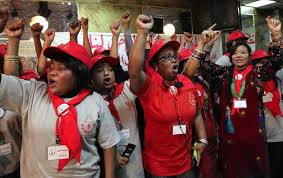
Yesterday, more than 200 women from Ethiopia, Nepal, the Philippines, Sri Lanka, Bangladesh and beyond met to establish a first in the country, a union for migrant domestic workers. For decades, domestic workers have struggled with the `kafala system’, a `sponsorship’ system that binds migrant workers to their employers. This system gives employers practically absolute free rein over their domestic workers, because, under the kafala system, a domestic worker cannot quit. That would mean losing her sponsorship. It’s a vicious and often deadly cycle.
Domestic workers have struggled to tell their own stories and to frame the larger narrative for themselves. Ethiopian born domestic worker and filmmaker Rahel Zegeye explained, “We often hear stories of abuse and bad treatment of Lebanese employers towards their foreign domestic workers (maids). Most media and organizations working to help migrant domestic workers (MDWs) in Lebanon portray the worker as a helpless victim, her fate ruled by evil agencies and bad madams. Although this often does happen and is definitely an issue that needs attention, reality is much more complicated.”
In Lebanon, domestic workers have joined with organizations, such as Kafa (enough) Violence & Exploitation, the Migrant Workers Task Force, and others, to end the kafala system and more. They’ve launched research projects, social media campaigns, film and other media projects, to decry the inhumanity of the system and the brutality that is visited upon them regularly. They’ve tried to contextualize the tragic and regular tales of suicide among migrant domestic workers in Lebanon. Throughout, they’ve insisted that their human rights story is a women workers’ story.
To that end, the women persuaded Lebanon’s National Federation of Labor Unions to endorse their union proposal. Five weeks ago, the Federation submitted a proposal to the Labor Ministry applying for formal recognition of a migrant domestic workers’ union. As Carlos Abdullah, head of the Federation, explained, “We’re in a struggle phase now … This is the start of the journey and we don’t know how much time it will take to set up the union.”
With the National Federation of Labor Unions on board, migrant women workers, from all over the world, established their own autonomous women workers’ space. According to Lily Jacqueline, from Madagascar, “It’s a big step forward. Maybe we could have a common contract for all domestic workers and force employers to abide by it.” Gemma, who has lived in Lebanon since 1993, concurs, “We domestic workers are not seen as real employees. We are … employees, not … slaves.” Leticia, a Filipina domestic worker, agreed, “We want to be treated like human beings, like real workers. With this union, I will no longer feel alone in the face of abuse.”
To no one’s surprise, the Ministry of Labor today rejected the proposal, saying it prefers a legislative route, which has thus far completely failed women workers, rather than one of trade unionism. The struggle continues, and the women continue to organize to be treated like human beings, like real workers.
(Photo Credit: AFP/ Anwar Amro)